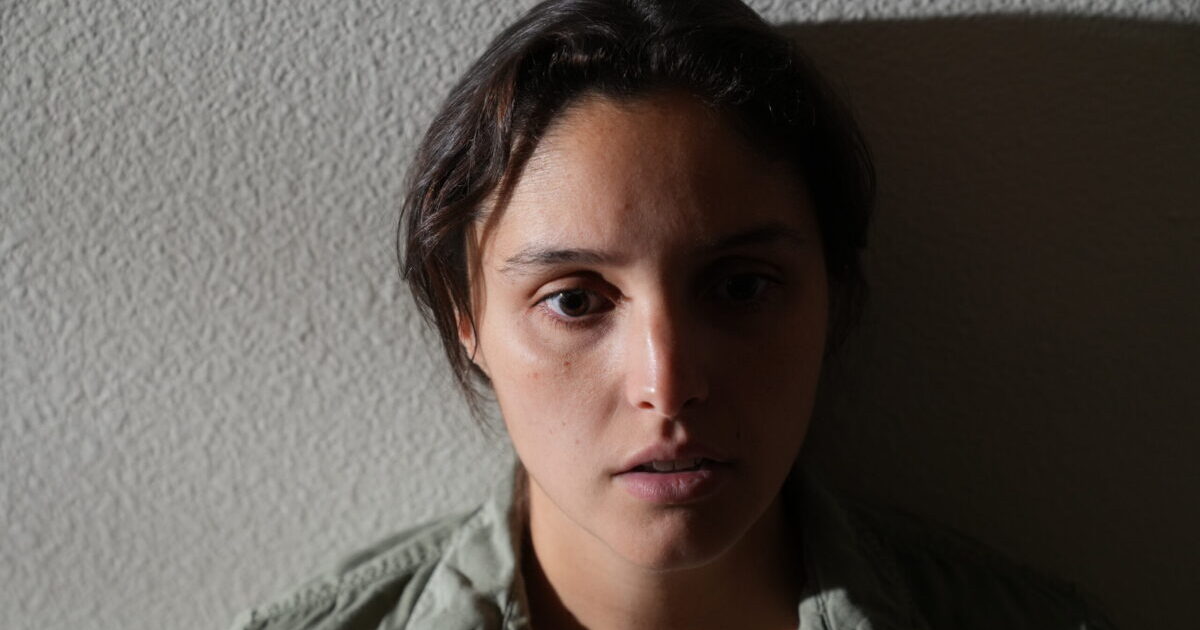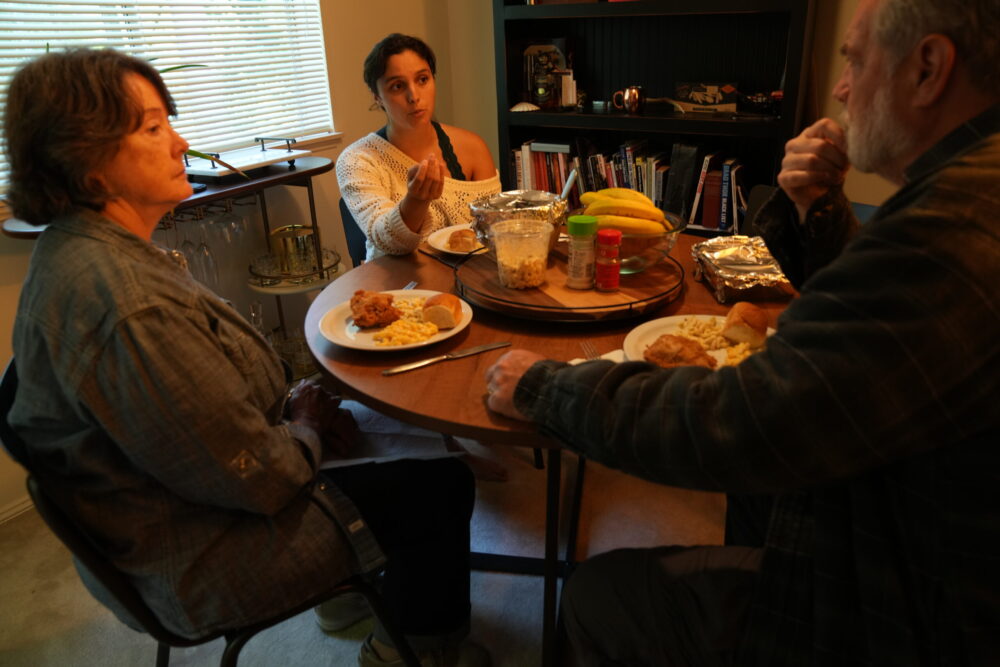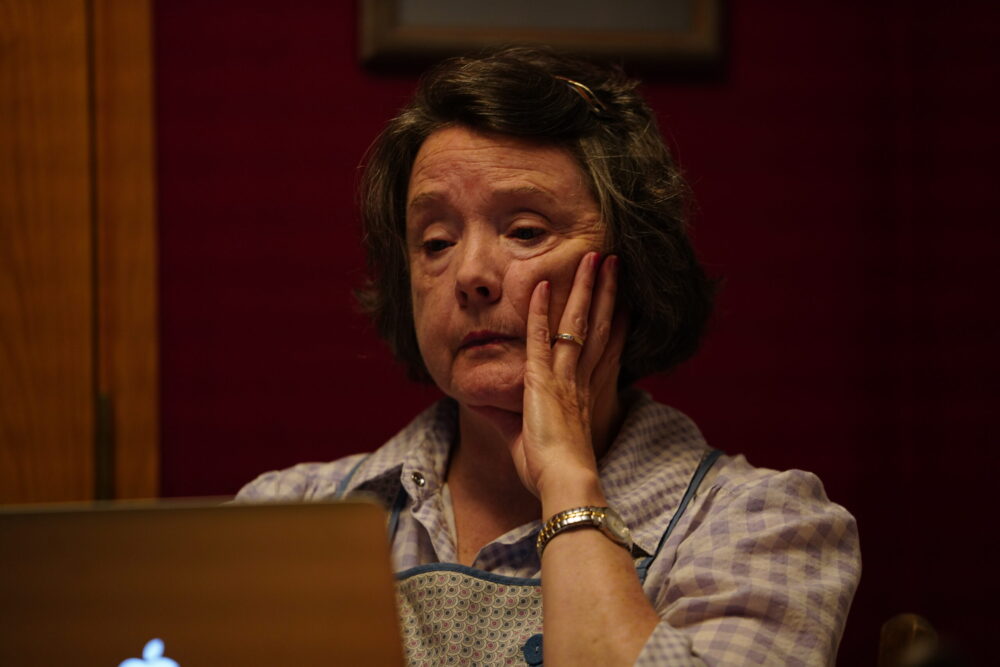
A “new normal” calls for new ways to work, socialize, and, for Sheila Houlahan (The Little Things, Wallflower), create films. This innovative adaptation of Marsha Norman’s award-winning 1982 play ‘night Mother premieres exactly once on leading live streaming platform Twitch and blends pre-filmed segments with live scenes recorded as the audience watches. The production team will host a post-show panel afterwards with mental health resources and celebrity Twitch streamers for a debrief and discussion. The recording will remain online after that in Twitch’s library.
Serving as both executive producer and starring as Jessie, Houlahan will act opposite acclaimed voice actor Ellen McClain (Portal, Half-Life 2) who portrays Thelma, Jessie’s mother.
“It’s a really visceral show,” remarks Sheila. “Part of the reason we wanted to do a post-show panel and discussion and have a moment for everybody to grow into themselves, and then provide resources, is because it’s so visceral.”
For the uninitiated, ‘night Mother revolves around a mother-daughter relationship and begins with Jessie calmly telling her mother about her plan to commit suicide that evening. In this upcoming film adaptation, the story is modernized to reflect the stressful, uncertain, and Zoom call-filled 18 months of COVID-19 that continues to ravage the world. Visceral indeed.
“One of the reasons Twitch excites me as a platform for the arts, and specifically film, is it gives you that ability to have instant community building amongst the audience,” says Sheila about the decision to adapt this play for the live streaming platform. “Rather than triggering the bananas out of people, then being like, well, bye! is that it allows for more ability for production to take on responsibility.”
The idea began in August of last year during a rap session between longtime friends Sheila and Ellen.
“We got together and were like, let’s do a thing! It’s COVID, we’re stuck at home,” says Sheila, characteristically bright yet sardonic. “If we were going to get really involved with the text of something, not even to put it on, but just for the sake of studying, what would it be? And she threw out ‘night Mother, and the second she threw it out, I felt like this is how we have to do it, we’re going to make it a real thing! Everything came to me at once, and I was like, we’re doing this, we’re taking it seriously. Because ‘night Mother is a play that helped me when I was struggling with my own suicidal ideation and my own history of mental health.”
“I knew the impact that this text had as a way to generate healing,” she continues. “It really doesn’t pull any punches. But it is so elegant and genius at how it doesn’t just put the stark reality of suicide or the stigmatization around mental health in front of folks. It immediately generates healing with the text that’s brought up, especially with systemic inequities that lead to these situations. Like who are the people who disproportionately are in this position?”
Adapting the original text to fit this untapped new format was a challenge, but a rewarding one for the duo and their team.
“It was Ellen who did the bulk of the adapting and she is a genius in that right. I think this thing went through like a dozen different iterations, but over the course of its lifecycle, Ellen found a way to take a two and a half hour show and condense it to 60 minutes,” explains Sheila. “What kept coming up for us is that in a stage play, the audience is kind of trapped, they’re rooted to the spot, right? They paid for the ticket, they’re going to finish the show…But when it’s a Twitch stream, you could just close the X on your monitor, and nobody’s going to know that you left. And we’re resetting the story to exist on a Zoom call in the pandemic, which, as we know, is a slow and torturous medium, so how do we take natural pauses that make sense in a stage play, and switch it up so that it just rises and rises and rises and then it ends?
Also on the team are acclaimed voice actor John Patrick Lowrie (Halo: Reach, TF2) who will direct, rising-star cinematographer Trevor Roach, and legendary photojournalist Eli Reed who will head up production photography.
“Without my whole team, I know I couldn’t have done this,” reflects Sheila seriously. “This has truly been a collaborative project. Everybody is bringing their expertise to the table and making something that I know I could have never made on my own.”
Part and parcel to this project’s ability to attract talent and partnerships was its unflinching confrontation of mental health issues we’d often prefer to sweep under the rug, a particularly relevant theme for a world in crisis.
“The conversations that have started and the connections that have been made, like real, authentic, organic connections, are because this is such a timely story. We are fortunate to have Eli Reed as the stills photographer for this piece,” explains Sheila. “He heard about it and was like, that is a story that needs to be told and I need to help tell it. There’s not even room for doubt with this production because everyone is like, yes, this is a story that touches me and yes, I want to be on the frontlines with it and help tell it.”
The confluence of talent like Ellen McClain and John Patrick Lowrie collaborating on a Twitch project will not be lost in video game fans. Both are voice actors on prominent games like Portal, Halo, and DOTA, and are also married to each other.
“I realized, Okay, wait a second, I’m working with Ellen McClain. There is a pitch here, there is a way to collaborate with Twitch.” Sheila goes on. “And our main point of contact, he was like, mental health has touched me too this year, this is important. Goodness knows it’s important for our streamers. And it’s important for our viewers and our regulars.”
Sheila goes on to explain the importance of holding a post-show discussion and her team’s focus on ease of accessibility for the film.
“We’re going to have the support of The Trevor Project and a couple of really amazing mental health orgs, who are going to be able to come and share resources and other accessible, affordable ways that folks can get immediate care if they’re in crisis. That’s going to be a big part of the post panel show, integrated with familiar faces, like celebrity Twitch streamers, who are going to be sharing their own personal experiences to show that you’re not alone. We’re in this together.”
She goes on. “What I am so thrilled about is that we can bring something specific to a demographic that I feel is all too often hung out to dry. We talk about wanting to create initiatives and connect with Gen Z or the young people these days, and we don’t often bring content to them. One thing that we cannot leave behind from this pandemic is the knowledge gained on how much easier it is for folks to participate when you bring something into their homes.”
So…how do you make a movie for Twitch? A lot of pre-planning and a commitment to authenticity.
“Part of this has been the challenge of adapting a story based off of the expectations of a Twitch audience. In speaking with Twitch about the project, they said that proving a show is live is super important to streamers, which was new for me,” remarks Sheila. “We discovered that there are going to be some beats in the script itself, where it will cut back and forth between live and pre-filmed footage that’s totally planned out. And then there’s going to be some moments that are a little bit more improvisational, and moments where I and Ellen, and even the director aren’t going to know where the footage is coming or why.”
This pandemic-updated version of ‘night Mother will also lean into the Zoom hells we’ve all experienced and enhance the immersion and participation of the audience.
“We’re trying to bring the meta of Zoom, and Zoom glitchyness, and how hard it is to try to connect with somebody when your internet is spotty. If you’re trying to have a heart to heart and then all of a sudden, it’s like, bzzt bzzt, and you can’t hear them, then you’re dying on the inside,” says Sheila. “And we’re already so far apart. So we’re going to be using some of that footage to generate that and also have it appear as Jessie’s consciousness being like, this is the first time I’m stepping into my own power. And I am absolutely overriding our scheduled programming. It’s got a little bit of an AI flair to it.”
Sheila explains with excitement how close the audience will be to the filmmaking process. “We’re really leaning into the idea that everybody is going to get to watch this filmed in real time. Everybody who attends live gets to see us discover the film live as well.”
This unique blend of pre-planned footage and live improvisation, as well as the targeted decisions made during production of what pieces of the play to cut, keep, or edit, led to some wonderfully unplanned on-set experiences.
“There was this surreal moment that I have to share where we were all at this lake filming what feels like found footage of the dad who has passed away,” begins Sheila. “It’s footage of him standing at a dock and it’s golden hour and he’s getting ready to go fishing…the martini shot of that day: there’s this bush in front of him and the sun is setting and it’s framing around him like a halo effect. And then out of nowhere, these starlings all burst forth from the bush and fly off, like a stupidly picturesque shot. Meanwhile we have a prop that we were filming that has starlings all over it, and I didn’t know starlings lived there. So there were little moments like that, that you couldn’t plan for that were so aligned with the lack of reality that we’re going for with the pre-filmed segments.”
Working on a project that deals with such dark themes has been a challenge for Sheila, but one that she’s learned a great deal from.
“I am so similar to Jessie,” confesses Sheila. “Part of the hard stuff is trying to figure out where I end and where Jessie begins…As an actor, I have been coaching this over and over again, I’ve been talking about it in therapy, I have been carving out space for myself. Because it is so hard to deliberately trigger a spiral, a suicide spiral. And there is no way to really do Jessie justice without actually triggering it.”
Sheila explains. “Because so much of the filmmaking is going to feel like a live Zoom call, if it isn’t immediate to the audience, then people are going to be like, Why should I stay tuned in…There have been many rehearsals where I’ve left and felt emotionally devastated, and while I don’t necessarily advocate that folks do that to themselves, I do believe that I will have done Jessie right if at the end of this experience, I am able to allow myself to be destroyed, and to rely on a decade in therapy and the skills that I have cultivated to pull me out of it again.”
‘night Mother is an intentionally heavy and triggering show, something Sheila and her team wanted to handle as responsibly as possible.
“One thing that I want to highlight is responsible storytelling. This project involves suicide. I think it’s important to mention that upfront. We’ve been working closely with the National Action Alliance for Suicide Prevention. They have guidelines on how to talk about suicide or show it in TV or film. And one thing we’re deliberately doing is not showing it. All too often, especially in the past 10 years, I feel like there’s so much TV and film that almost does pornographic representations.”
She goes on, “In putting this together, I wanted to make sure that we weren’t putting something out there to add to the din or to people’s distress. I wanted to make sure we were putting something out there that could help alleviate it and show that folks aren’t alone.”
Sheila and her team spent countless hours deciding how to strike the right tone for this adaptation. They strove to convey both hope and healing, as well as matter-of-fact acknowledgement and empowerment.
“I think it needs to be painful, it needs to be visceral, because we need stories that show that this is a very real current problem, or else we cannot hope to address it. We cannot hope to fill in the ineptitude of the current system and the gaps that people are falling through like giant human sized Swiss cheese.”
This directness is reflected in every piece of the project including its PR and marketing.
“We’re going to honor what Marsha Norman did first and foremost, and instead of talking about how nobody is alone, we’re going to use hashtags like #NoMoreGoodNight, or even just #StopSuicideNow. There’s not necessarily a positive slant, but there is an action to it, because we don’t want it to feel like, the world is dark, and we can’t do anything about it. That’s not the purpose of this art that we are creating.”
Achieving such a balance is a challenge, but one Sheila’s determined to meet.
“Finding ways to let the feelings transmute and turn into healing has been really key. It’s been a balance, but I think it’s also not rocket science. And I think it’s on us as creators to do the responsible thing and know that our films and our stories impact people.”
‘night Mother will premiere this September exclusively on Twitch. You can reserve your spot here.



